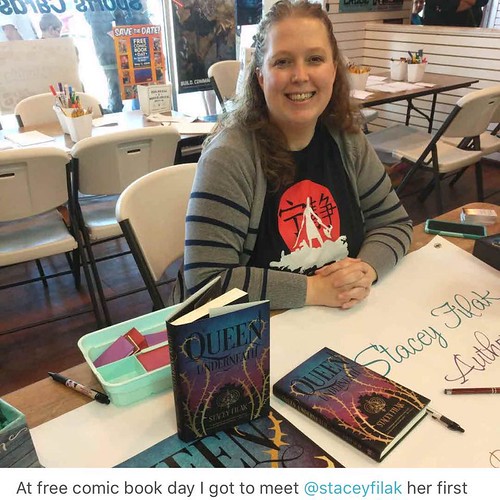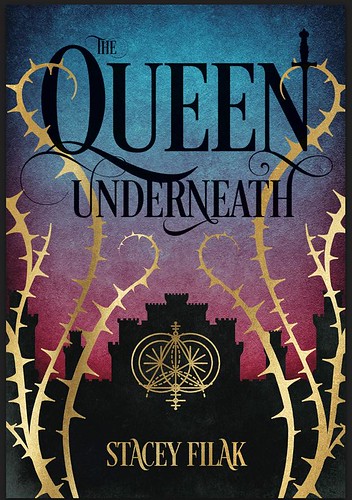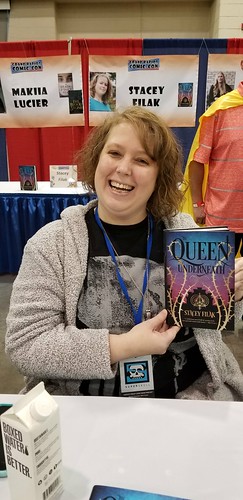There she sat, at a VERY popular Free Comic Book Day at Fanfare Comics, in Kalamazoo, Michigan. Though her table was swamped, we still edged in to ask about her book, which has a gorgeous cover and an intriguing title. Enter author Stacey Filak (and her book) into our lives, and hearts.

Her book, The Queen Underneath, is an interesting, delicious read, full of twists, turns, and of lives intertwined by circumstance. It's hard to get a retelling of a classic story right, and Filak really nailed it. I was enthralled from the first page, and couldn't put it down. The worldbuilding is world-class!

We followed her to Grand Rapids Comic Con, where we headed to her writing workshop on worldbuilding in fiction.

From there, we had a chance to talk with Stacey about worldbuilding (and her book, of course). Here's what she had to say...

Please tell us about your new book, The Queen Underneath...
The Queen Underneath is the story of the city of Yigris -- a once great nation that was decimated by a mage war a hundred and fifty years prior to the beginning of TQU -- now a minuscule city-state that survives through unusual means. Two factions rule Yigris. Above is ruled by a king and consists mostly of nobles and the court, while Under is home to thieves, assassins and sex-workers, and is ruled by the Queen of Under. Our story begins when both the King of Above and the Queen of Under are assassinated on the same night, leaving their two heirs apparent to clean up a mess that no one foresaw coming -- the city under a sleep spell, an invading army of mages, and an impending war they cannot hope to win. It's been called a very loose, dark retelling of Sleeping Beauty, but I like to call it a found family adventure with lots of kissing.
How do you start writing and researching for your books?
Honestly, each book is different. Sometimes, a character comes to me first, and the story builds around them. In the case of TQU, I first envisioned the opening scene, in which Gemma, our heroine, breaks into the secret meeting room at the palace by disarming a series of traps. I had this idea for this young woman, alone but skilled and confident. She was in this network of tunnels that ended in an ornately decorated door that was trapped with tons of classic D&D type traps. That was the entire basis of my idea, when I started to write the book. I had the image, and I needed to build a story and characters around it.
For other books, an idea or theme might pop up, first. I'm working on a book that takes place during the Viking era, and for that one, I definitely started with research. I've read four or five books on daily life during the Viking era, another three on Norse mythology, and dozens of hours of internet research. It's amazing the wormholes you can fall down... I've spent whole days learning about the clothing worn by Viking peasants. One of the characters in the book is a blacksmith/weaponsmith, and I'm not too ashamed to say that I've watched an inordinate amount of Forged in Fire. Research takes all kinds of unexpected forms.
In writing fiction, why is worldbuilding so very important?
Oh, man. Worldbuilding is important, because it's both the bones and the accessories. Or if you don't mind me mixing my metaphors, it's the foundation and rafters of your story, but also the decorative shutters and fancy door knocker. If you don't figure out your world at its most basic -- economics, politics, religion, geography, etc. -- then you'll have no basis for the fun stuff. In real life, culture dictates things like clothing and food. Religion dictates things like marriage, birth, and death. Geography might dictate a person's occupation or the type of food available to them. If your world doesn't have bones and rafters, then the choices you make for the decorative things -- the things that make your characters come to life -- don't really matter, and might not make sense.
Beyond that, worldbuilding is what sets your book apart from the next fantasy book. Let's face it -- there are only so many stories in the world. The hero's journey has been told (and loved) so many times because authors continue to build new worlds to tell it in.
How do you keep worldbuilding consistent?
Truthfully, I'm still working on this. I am an unrepentant pantser, in that I don't use an outline. I've never met an outline that didn't ruin my desire to write, which is both a blessing and a curse. So a lot of my worldbuilding happens on the fly. I'm lucky to have a pretty good memory for detail, which helps a lot, as I draft. I also reread as I'm drafting, which helps engrave details in my mind. When I've finished the first draft and I begin to revise, I really examine all of my worldbuilding details. Do they make sense? Do they fit together appropriately? Have I been consistent throughout the manuscript? Have I gone deep enough to give the reader a sense of the place?
Then my agent and beta readers will read the manuscript and we'll go over all of the worldbuilding stuff together. At some point, during revisions, I usually end up making charts or glossaries to keep track of details. I also keep notebooks full of character descriptions so that I don't call someone's eyes blue in one chapter and green in another. This also helps me keep track of names, so that all the characters don't have names that start with M, or end in -ara. (It's a bigger problem than you'd think. :) By the time the book goes to the editor, it's been gone over with a fine tooth comb about 20-30 times, so... hopefully, I've caught all of the inconsistencies. But thankfully, editors and copy editors are the experts on things like this, and they'll find any places where I botch the landing.
What are the most important elements in worldbuilding?
I think this absolutely depends on the book. Brandon Sanderson has built his career on creating intricate and unique magic systems. N.K. Jemisin's HUNDRED THOUSAND KINGDOMS takes place in a world where gods walk on earth (and are main characters), so the religion had to be the most important aspect of her worldbuilding. However, that didn't mean that other aspects could be ignored completely. Kameron Hurley consistently creates worlds that question our society's gender norms, so sexual politics tend to play a major role in her worlds. Daniel Abraham's THE DAGGER AND THE COIN series was at least 40% about economics.
Each world you build is different, and I'd wager, each character within that world would find a different aspect most important. If you've developed well-rounded characters with true story arcs, they'll be motivated by more than the events of the immediate story. Even though you might not be writing their backstory, every character has lived a life that was affected by the world around them, long before the opening line. That's why world-building can become so obsessive. It's a rabbit hole of storytelling that wants to be delved, and it is the storyteller's nature to get caught up in the juicy tidbits.
What's up next for you?
I've recently finished writing an adult fantasy which I hope will eventually become a duology, that I'll begin revising soon. I've got a middle grade fantasy that is looking for a publishing home, and a YA near-future SciFi manuscript that I'm almost finished with. Plus, there's always a couple of half-formed ideas percolating and taking up brain space.
Stacey Filak was born in a small town in Michigan, where she dreamed of hero's quests, epic battles, and publishing a book. At least a couple of things have come true. She lives in Kalamazoo, Michigan, with her husband and four children, and a menagerie of pop-culture named pets. She manages a veterinary clinic as her day job and aspires to someday write something that means as much to someone else as her childhood favorites mean to her.

Find Stacey online:
www.staceyfilak.com
https://www.facebook.com/staceyfilakauthor/
Twitter: @staceyfilak
Instagram: filakstacey
Writers! Pin for later:

More articles in our Write This series:
Write This: Author Susan Dennard on #Ownvoices
Write This: Author Kristen Simmons on the Importance of Backstory
